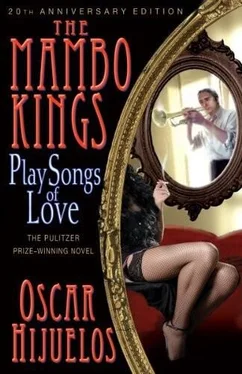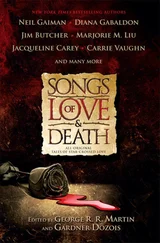“Please, please,” he kept repeating, and so adamantly that Eusebio took a long look at him, tipping up his black-brimmed hat and saying, “Well then, suppose I do teach you, what are you going to pay me? You have any money? Your family have any money?”
Then: “Leave me alone, I must be paid.” But Cesar persisted, and when Eusebio sat down exhausted on the church steps, he said, “I’ll bring you food.” Then: “And I can bring you rum.”
“Rum? Well then. That seems fair enough.”
So he started taking music lessons, bringing Eusebio a pot of stew or rice and beans, whatever his mother had cooked that day (she gave him the food), and a jar of rum, which he’d fill from a cask that his father kept in the stone house where he would slaughter his pigs at the edge of their field, and all went well, with the kid learning a little piano and trumpet, until the day that his father caught Cesar filling the jar and gave the boy the beating of his life, slapping his face and going at his legs and back with a knobby branch that he pulled down from an acacia tree. And he remembers how that really started all the bad blood between him and his father, because now his son was not only a free spirit but a thief to boot! And he would not stop taking the rum, no matter how well his father hid it, and he kept getting caught and got more beatings so that he learned to hold his arms in an arc over his head and to take his beating like a man, never crying, insolent and disrespectful, and strong because, after a while, he hardly felt the stick, the belt, the fist. He sometimes arrived at Eusebio’s house with black-and-blue marks on his arms, bruises which touched Eusebio’s heart. (Why did these memories keep coming back to him?)
And Eusebio Stevenson himself waiting on the porch, clapping his hands when he’d see Cesar approaching. “Come along!”
There was a mattress on the plank floor of his parlor, a few chairs, a table, a coffeepot, and by a back door that opened out to a thick bush, there was a chamber pot. But then, in the center of the room, against the wall, was an upright Móntez & Co. piano, its soundboard facing decorated with mother-of-pearl nightingales, stars, and arabesque moons.
“Do you have the rum?”
Cesar had carried it wrapped up in one of his mother’s scarves. He gave him the jar, which Eusebio emptied into a beer bottle.
“Good,” he said. “Now sit here and we’ll begin.”
The first lessons involved the demonstration of simple chords, the idea of playing the bass with the left hand, the melody and chords with the right. Eusebio seemed cruel, showing no mercy in spreading Cesar’s small fingers wide across the fingerboard and stiffly pressing them down. He told the boy to memorize the scales; emphasizing this, as he couldn’t teach Cesar how to read music. He impressed the boy, however, with talk about major and minor chords, chords of joy and friendliness and chords of sadness and introspection. Then he demonstrated what could be done with a single chord, playing all kinds of melodies above it. And now he was hearing Eusebio saying something else that he would always remember.
“When you play music you have to remember that just about everything composed has to do with love and courtship. Especially when you learn to play your older music, like the habaneras, zarzuelas, and our own Cuban contradanzas. It has all to do with romance, the man holding a woman around her waist, bowing to her, and then having that one moment in which he may whisper something in her ear, the ladies like that. In the case of the contradanzas, there’s a minute’s pause, hence the name, ‘against the dance.’ And during that pause the man would have a chance to talk to the woman.” He then began to play “La Paloma ” and then demonstrated all the different styles of piano, including a ragtime piano he’d picked up while living in New Orleans once.
“And you have to remember, boy, that what people want is to throw up their arms and say, ‘Qué bueno es! How wonderful,’ when they hear the music. Understand?”
Yes, love was so beautiful, the music told him, pulling him through the fields at night when the owls hooted and the shooting stars passed overhead in the sky, all the planets and stars melting like wax.
Grief endless, and over the countryside, sad bonfires and his Papi’s voice, his Papi giving him a beating, and he would form an arc over his head with his elbows for protection, never crying, taking his punishment like a man. Even on those nights when he couldn’t believe what his father was doing, when he was just a little kid holding the door that his father pounded on so hard trying to get inside to hurt him.
Y coño , he would call me over and pull me hard by the arm, and hold my arm by the elbow, squeezing: he had powerful hands from his day’s labors, hands covered with cuts and calluses, and he’d say, “Boy, look at me when I address you. Now tell me, niño , what is it exactly that I am seeing in your eyes? Why is it that you turn away from me when I walk into this house, what is it that you are hiding from me?” And if I told him that I was hiding nothing from him, his hold would get harder and no one could pull him off me, nor would he stop — I refused to cry, the Mambo King has never cried over a man — and he would hold me until my arm turned black-and-blue or until my mother had pleaded long enough with him not to start something with me, u n niño. “If you want to start something, why don’t you go back to town and start something with those men who insulted you?” And then he would start to take it out on her. And so, when he would come home in such bad moods and he asked me or one of my brothers why we had mischief or disrespect in our eyes, I stepped forward, I had the disrespectful answers. If he asked me, “Why are you looking at me in this way, boy?” I didn’t keep my mouth shut like before, I answered, “Because you’re drunk, Papi,” and then he would beat me, but it would happen very quickly, and he would hit me until his palms were dark red and hit me until he saw how cruel he was being, and then he would call me over and ask my forgiveness, and because he was my Papi, I was happy to be back in his good graces again, and so you know that’s why I took this from him, because my father is my father.
And he saw his mother again, saw his mother’s loving face, indistinguishable in memory from the stars he’d watch from the porch at night in Cuba.
“Te quiero, mijo” is what she used to say.
He was only a little boy then. He used to fall asleep with his head pressed against his mother’s breasts, hearing her heartbeat and those little gasps. That was when the Mambo King had sweeter ideas about women, when his mother was the morning light, the light burning through the treetops. That was the time when he felt that he was part of her very breath, wishing, wishing (and here the Mambo King feels a tightness around his eyes) that he could do something to end her sadness.
Pressing his head against her belly, he’d wonder, “What’s inside there?”
Years later, as a man, kissing women’s privates, he’d tremble with the recollection of how he’d imagined the whole world inside his mother’s womb.
“My mother, the only mother I’ll ever have.”
She was sewing his shirt and running a thick cord through the soles of a ratty pair of shoes to repair them. “Ay, I used to love dancing when I was a young girl.”
She had one prized possession, the only thing he would remember from that household as having any value, an old mahogany music box from Spain, a family heirloom. It had a big bronze key, whose head was shaped like a butterfly, and it played a cheerful zarzuela. She would wind the key and say, “Come dance with me, child.”
Читать дальше












